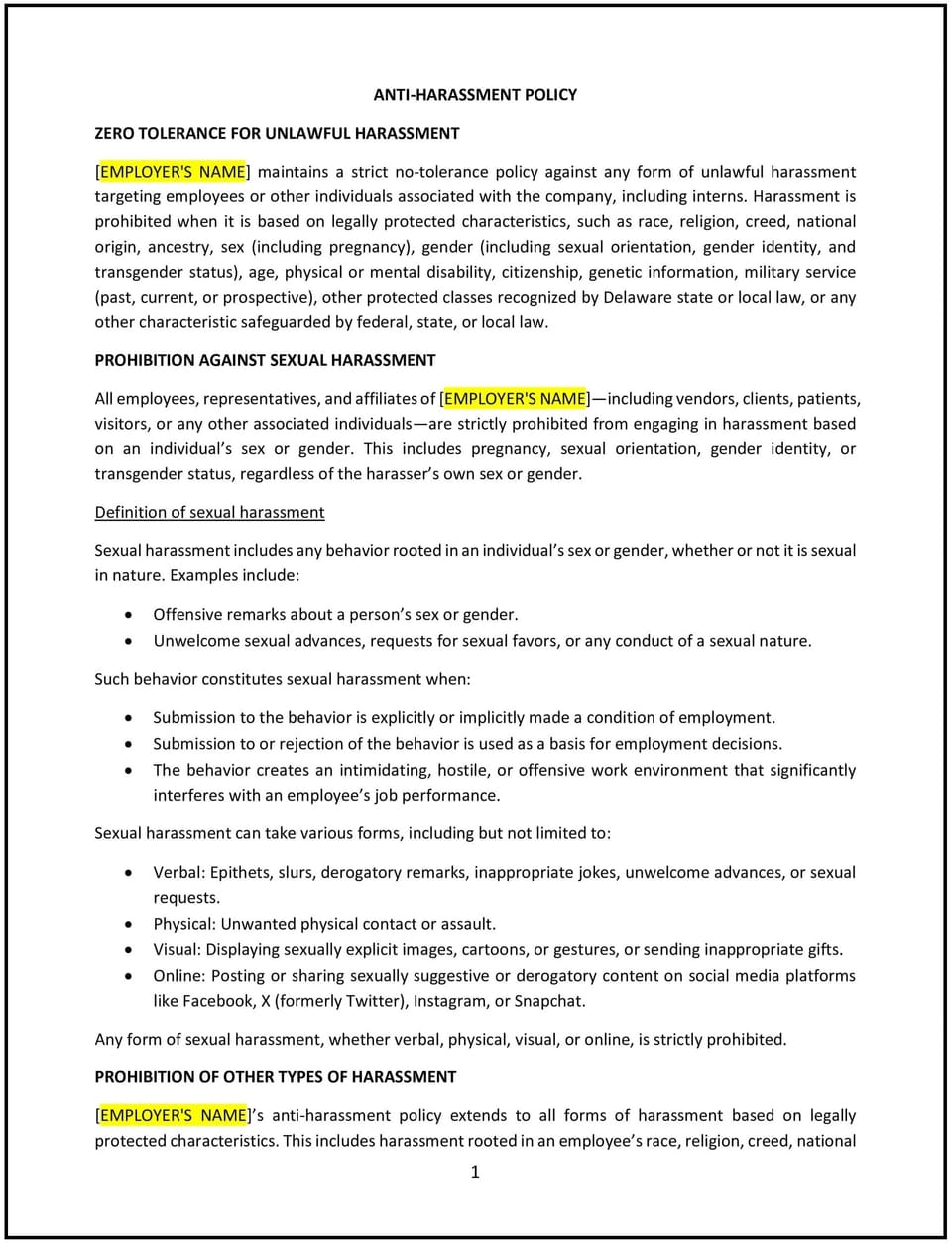Anti-harassment policy (Delaware): Free template

Anti-harassment policy (Delaware)
An anti-harassment policy helps Delaware businesses create a respectful and safe workplace by outlining guidelines for preventing, identifying, and addressing harassment. This policy covers all forms of harassment, including sexual harassment, discrimination, and bullying, and establishes procedures for handling complaints and enforcing disciplinary actions.
By implementing this policy, businesses can support a positive work environment, protect employees' rights, and reduce legal risks associated with workplace harassment.
How to use this anti-harassment policy (Delaware)
- Define harassment: Clearly explain what constitutes harassment, including examples of prohibited behaviors such as verbal abuse, offensive remarks, and physical intimidation.
- Establish complaint procedures: Provide a clear process for employees to report incidents of harassment, including confidential reporting options and steps for investigating complaints.
- Appoint responsible officers: Designate specific individuals or teams responsible for handling complaints, investigations, and follow-ups.
- Train employees: Conduct regular training sessions to educate employees about harassment, reporting procedures, and the company’s commitment to a respectful workplace.
- Enforce accountability: Ensure all employees, regardless of position, are held accountable for their behavior and that violations result in appropriate disciplinary action.
- Monitor effectiveness: Regularly assess the policy’s effectiveness by reviewing incident reports and feedback from employees.
Benefits of using this anti-harassment policy (Delaware)
This policy offers several benefits for Delaware businesses:
- Supports a respectful workplace: Establishes clear expectations for respectful behavior, fostering a positive work environment.
- Reduces legal risks: Helps businesses address harassment complaints promptly and properly, reducing the likelihood of legal claims.
- Improves employee morale: Demonstrates the company’s commitment to employee safety and well-being, boosting job satisfaction and engagement.
- Promotes fairness and equality: Ensures all employees are treated fairly and respectfully, regardless of their role or background.
- Enhances company reputation: A proactive approach to harassment prevention strengthens the company’s image as a responsible and ethical employer.
Tips for using this anti-harassment policy (Delaware)
- Communicate the policy clearly: Ensure all employees are aware of the policy, understand what constitutes harassment, and know how to report incidents.
- Encourage open communication: Foster an environment where employees feel comfortable reporting harassment without fear of retaliation.
- Provide ongoing training: Regularly train employees on recognizing and preventing harassment to maintain a respectful workplace.
- Ensure fair investigations: Conduct impartial and thorough investigations of all complaints to ensure fairness and accountability.
- Review the policy regularly: Periodically review the policy to ensure it remains relevant and effective in addressing workplace harassment.
Q: Why is this policy important for my business?
A: This policy helps create a respectful work environment, reduces legal risks, and demonstrates a commitment to employee well-being and safety.
Q: What types of behavior are covered under this policy?
A: The policy covers all forms of harassment, including verbal, physical, and visual harassment, as well as sexual harassment, discrimination, and bullying.
Q: How can employees report harassment?
A: Employees can report harassment through the procedures outlined in the policy, which may include confidential reporting to HR or designated officers.
Q: What happens after a harassment complaint is filed?
A: The company will conduct a thorough investigation of the complaint and take appropriate disciplinary action if a violation is confirmed.
Q: How often should this policy be reviewed?
A: The policy should be reviewed annually or whenever there are changes to Delaware laws or workplace practices to ensure it remains effective and relevant.
This article contains general legal information and does not contain legal advice. Cobrief is not a law firm or a substitute for an attorney or law firm. The law is complex and changes often. For legal advice, please ask a lawyer.


